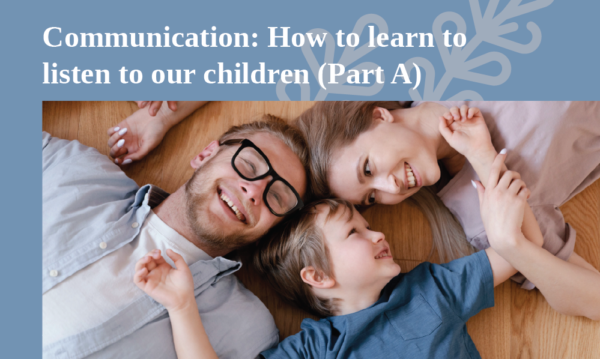If you want to create a good relationship with your children, it is necessary to learn to communicate positively and constructively. If you want children to share with you, you need to convince them by your attitude and behavior that you are interested in listening to them.
It is widespread in many families that communication between parents and children is problematic. It is essential to talk with our child and not to our child. When we speak to our child, there is often whining, reminder, criticism, threat, “preaching,” “interrogation,” advice, evaluation, demotion. This type of communication should not generally characterize interpersonal relationships, and, mainly, the communication between parents and children, which in such cases is hindered, rather than improves the relationship between parents and children and creates tension.
What are the roles we play when children express their feelings?
Not a few parents find it wrong to externalize their negative feelings, such as anger, fear, or frustration. This is due to their inability to manage the manifestation of their children’s negative emotions and thus react by taking one of the following roles:
The commander-in-chief: This parent always seeks to control the situation. He demands from the child to get rid of his negative emotions immediately and uses orders, commands, and threats to manage all the issues that arise.
The moralist: The parent who chooses this role is the one who always says, “you must.” “You have to do this,” “You shouldn’t do that.” He is the parent who preaches and is interested in having his child have the “right” and appropriate feelings and reactions.
The omniscient: These parents continuously seek to prove to the child that they can provide solutions/ answers to all the problems that arise in life because of the experience and knowledge they have acquired during their life. They are accustomed to “preaching,” advising and urging the child to rely on his/ her logical/ critical ability.
The judge: These parents condemn the child before the “trial” is held. They want to continually reaffirm their expectations that their behavior is always right and that the child’s behavior is still wrong.
The critic: The parent who chooses this role is primarily interested in being right; to degrade the child, the judge relies on ridicule, the labels he gives the child, sarcasm or irony (“you’re stupid,” “you can’t do anything,” “you’re scared,” “you’re lazy,” etc.).
Psychologist: The parent who takes on the role of the psychologist tries to analyze the problem. Having the best intentions, he wants to hear all the details to correct the child. The psychologist analyzes, asks questions, and makes a diagnosis.
The comforter: Parents in this role try to avoid participating in the problem, taking the child’s feelings very “light.” A reassurance, a caress, and the pretense that everything will go well is their response to the child’s concerns.
How are you going to be a good listener?
Communication must be based on mutual respect, which means that children and parents allow each other to express their feelings and beliefs without fear of rejection; it means that we accept what the other says. You may disagree with your children, but you can show them that you accept their feelings. With the tone of your voice and the words you use, you indicate acceptance and attention. To become a good listener, you need to have the time, concentration, and real interest shown by your look and posture. Sometimes good listening needs verbal answers, while other times it requires us to be silent.
Reflective listening
To listen to our children, we need to give them the message that we recognize the feelings behind what they say, even behind what they do not express verbally. By listening “reflectively” to the child, we help him reconsider the problem that concerns him. We can act as a mirror, showing him his feelings to help him lay the groundwork to deal with the situation.
An example of reflective listening is this:
Child: The teacher is unfair! I’ll never make it to school!
Parent: You feel angry and frustrated, and you’ve put up arms.
In this way, reflective listening involves understanding what the child feels and wants to say and then telling him what you understood. So he’ll think that you know it and accept it.
Using reflective listening, we give answers that reflect the child’s feelings and what he means. It needs awareness of a wide variety of emotions, as well as communication skills. Reflective listening does not judge, but encourages the child to feel that they hear it, understand it and continue to speak.
Communication always takes place on both a verbal and non-verbal level. Our actions, body posture, facial expressions, and tone of our voice transmit messages, consciously or unconsciously; we can communicate without words, with a smile, a caress on the back, a frown. When we silently decide not to overprotect, not grumble or intervene, we give the message of acceptance; when we respond without judgment, we accept our child’s feelings and enhance understanding and communication.
How to respond to messages given without words:
Only by listening can we not perceive the meaning of a glum look, a smile, or a tearful face. Expression reveals what we mean in a more obvious way than words. We must learn to understand the meaning of the child’s behavior by taking its message with its expression regardless of the words.
Some ways we can respond to messages that are broadcast without words:
“With your frown, you seem to disagree.”
“You look delighted when your face lights up like that.”
“You seem very upset. Do you want to talk?”
Phrases that indicate that you distinguish the child’s indications in the non-verbal field motivate him to express his feelings.
How children react when parents start applying reflective listening:
When you try reflective listening, it will be new for both you and your child. That’s why you should expect a startling reaction to your first attempts to implement it. It is a good thing not to force the child to share his feelings with you but to leave him free to accept or reject your offer of help. Do not be discouraged if he does not react quickly. In your contact with the child, his problems are not always solved. Your patience and efforts to help him see his problems cleaner often help him deal with it alone later. Do not give up if reflective listening does not have a direct effect.
How to make an answer with reflective listening:
Reflective listening is a skill you acquire with effort and practice. The following method is beneficial to learn to listen to the child reflectively:
When your child sends a message about their feelings, think, “What does he feel?” Find a word that describes the emotion he feels.
Example: When your son says: “I will be thrilled when school is over! I don’t like it at all!” (Question: “What does he feel?” Now make a phrase with the word of emotion “It seems to me that you’re bored of school.”
If you focus on the question: “What does my child feel?” you will find that the reflective answer comes much easier for you.
What should you watch out for when applying reflective listening?
· When you make feedback findings, you can’t be sure you know exactly how the child feels. Watch the tone of your voice and avoid giving the impression that the person can read the thought.
· We don’t have to exaggerate when applying reflective listening, because the child can avoid communicating with us. Be discreet, and with awareness, you will understand when your child wants to talk and when not.
· If your child uses problems only to draw attention, an effective answer could be this: “We have discussed this problem several times. I don’t think I can help you with that. But I’m sure you can handle it.” If the child insists, stay silent and do something else or change the subject. The child may be unhappy with this answer, but he will understand that you are willing to help when he is ready to solve the problem.
· Perhaps the child will use his feelings to prevail over you or to avenge himself. Depending on the situation, you can decide whether to listen or withdraw from the “battlefield.”
· When you need to displease a child, avoiding listening to it, make sure you offer him positive attention at another time.
To be continued…
References:
Dinkmeyer, D., McKay, G., D., (1976). Parent’s Handbook, American Guidance Service, Inc.


